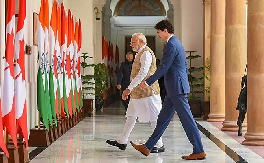The United States has called on India to cooperate with Canada’s investigation into “extremely serious allegations” linking “agents” of the Indian government with the killing of Khalistani terrorist and Canadian citizen Hardeep Singh Nijjar in Vancouver in June last year.
At a press briefing in Washington, D.C. Tuesday, State Department spokesperson Matthew Miller said the US had made it clear that Canada’s allegations “need to be taken seriously”.
“When it comes to the Canadian matter, we have made clear the allegations are extremely serious. We wanted to see the Government of India cooperate with Canada… obviously they have not chosen that path,” Mr Miller said in response to a US reporter’s question on ’round two’ of the Delhi-Ottawa crisis.
The US – discreet since the row erupted in September last year – was similarly restrained Tuesday, only emphasising the need for cooperation between the two countries.
“I do not have any further comment beyond what the two countries have said publicly. We have urged them to cooperate and will continue to urge them to do so,” Mr Miller said.
New Delhi has not yet responded to these comments but has repeatedly rejected the “absurd” and “motivated” allegations. Delhi has repeatedly asked for evidence and also pointed out the charges come as Mr Trudeau’s popularity tanks before next year’s general election.
Meanwhile, Mr Miller also underlined the strength of India-US relations.
“India continues to be an incredibly strong partner. We’ve worked with them on a number of matters, including our shared vision for a free, open and prosperous Indo-Pacific, and, when we have concerns, we can take those concerns to them and have candid conversations…” he said.
The India-Canada crisis, simmering over the past 18 months, erupted in September last year after Canadian Prime Minister Justin Trudeau accused “agents” of Delhi of being involved in killing Nijjar. He claimed “credible information” had been shared with intelligence partners, including the US
India, though, has said it has not been presented with evidence to back the charges.
The September accusation led to tension that included a fierce response from the Indian side and Prime Minister Narendra Modi, and a tit-for-tat expulsion of diplomats.
This week ties soured further after Royal Canadian Mounted Police said Indian government “agents” had colluded with organised criminal elements, particularly the Lawrence Bishnoi gang, to “target (Canada’s) South Asian community… specifically pro-Khalistani elements”.
That was followed by Mr Trudeau holding a press conference in which he backed the cops’ charges and criticised “a fundamental error” – that India thinks it can “engage in supporting criminal activity against Canadians, here on Canadian soil”.
“Whether it be murders or extortion or other violent acts, it is absolutely unacceptable,” Mr Trudeau said, claiming also that his administration had “shared our concerns” with Delhi.
He said Canadian police had spoken to Indian government officials but been rebuffed.
The Canadian federal police’s claims resulted by another round of diplomats being expelled from either side; this time Ottawa named India’s High Commissioner, career diplomat Sanjay Kumar Verma, as a ‘person of interest’ in an ongoing criminal investigation and removed him.
A furious India retaliated by expelling Canada’s acting High Commissioner, Stewart Wheeler, and five of his staff, and formally recalling Mr Verma and his staff over security concerns.
Nijjar – the mastermind behind banned terror outfit Khalistan Tiger Force – was on Delhi’s list of ‘most wanted’ terrorists for multiple crimes, including the murder of Hindu priest in Punjab. Anti-terror agency NIA had offered a Rs 10 lakh reward for information leading to his capture.



